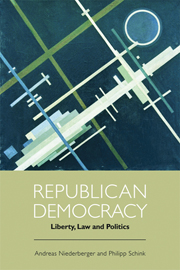Book contents
- Frontmatter
- Contents
- List of contributors
- Introduction
- 1 The Tension between Law and Politics in the Modern Republican Tradition
- 2 Impotence, Perspicuity and the Rule of Law: James Madison's Critique of Republican Legislation
- 3 Kant, Madison and the Problem of Transnational Order: Popular Sovereignty in Multilevel Systems
- 4 Republicanism and Democracy
- 5 Two Views of the City: Republicanism and Law
- 6 A Kantian Republican Conception of Justice as Nondomination
- 7 Two Republican Traditions
- 8 Freedom, Control and the State
- 9 Legal Modes and Democratic Citizens in Republican Theory
- 10 Rights, Republicanism and Democracy
- 11 Republicanism and Global Justice: A Sketch
- 12 Republicanism and Transnational Democracy
- Index
1 - The Tension between Law and Politics in the Modern Republican Tradition
Published online by Cambridge University Press: 05 October 2013
- Frontmatter
- Contents
- List of contributors
- Introduction
- 1 The Tension between Law and Politics in the Modern Republican Tradition
- 2 Impotence, Perspicuity and the Rule of Law: James Madison's Critique of Republican Legislation
- 3 Kant, Madison and the Problem of Transnational Order: Popular Sovereignty in Multilevel Systems
- 4 Republicanism and Democracy
- 5 Two Views of the City: Republicanism and Law
- 6 A Kantian Republican Conception of Justice as Nondomination
- 7 Two Republican Traditions
- 8 Freedom, Control and the State
- 9 Legal Modes and Democratic Citizens in Republican Theory
- 10 Rights, Republicanism and Democracy
- 11 Republicanism and Global Justice: A Sketch
- 12 Republicanism and Transnational Democracy
- Index
Summary
In this essay I will consider the way in which the thinkers of the modern republican tradition – from Machiavelli to the authors of The Federalist – conceived the relationship and inevitable tensions between politics and law. I will do this in order to show how some interpretations of the modern republican tradition proposed by contemporary neo-republican thinkers tend to be somewhat reductive.
My aim is therefore twofold. First, I wish to provide a concise, and inevitably selective, account of how modern republicans thematize the relationship between law and politics, while seeking not to betray the complexity and richness of their ideas.
Second, in the conclusions I will attempt to show how some of the questions that the modern republicans dealt with, as well as some of their assumptions, can still represent a valuable starting point for the elaboration of republican theories that might prove capable of responding to the problems of our time. I wish to suggest, albeit in a few brief remarks, that it is possible to reformulate some republican themes in a richer and more complex way than has been done so far, thereby giving greater attention to politics and its conflicting aspects. But to carry out this task – that straddles history and theory – I must make a few introductory observations on the modern republican tradition, on the various theoretical strands within it and on contemporary modern neo-republicanism, in order to define the scope of my inquiry as accurately as possible.
- Type
- Chapter
- Information
- Republican DemocracyLiberty, Law and Politics, pp. 5 - 40Publisher: Edinburgh University PressPrint publication year: 2013



